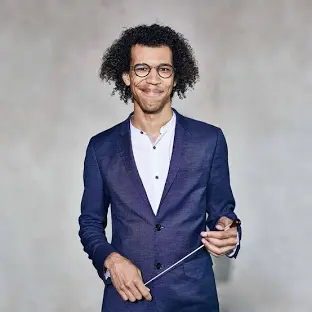The program was not a crowd pleaser. But the crowd seemed open to whatever they were given at this closing Aug. 10 concert of the Festival Orchestra of Lincoln Center’s summer season.
From a distance, the program looked a lot like a particularly wide-reaching New York Philharmonic subscription concert, but with key difference. No cellphone interruptions. There was applause between movements – good! – showing that newcomers were there. Also evident were music students and all-around music nerds who cheered when pianist Conrad Tao – after playing the Bach Keyboard Concerto in A – announced his encore as Elliott Carter’s Caténaires. I couldn’t believe my luck. Carter is wrongly typed as writing music that makes your head hurt. This piece has logic one could follow, from beginning to end on first hearing – an ultra-virtuoso whirling orbit of notes with near collisions from passing musical astroids. If only because of its sheer athleticism, the piece did everything you want an encore to do – and more.

Conduced by Jonathan Heyward, the chocked-full program had what was formerly the Mostly Mozart Orchestra stretched thin – and sometimes sounding it. Besides Tao, the concert had the world premiere of He stretches out the north over the void and hangs the earth on nothing, a meditation on the Old Testament parable of Job by British composer Hannah Kendall, a recent doctoral grad from Columbia University who, at age 40, already has a considerable body of work. Her title suggests all sorts of extra-musical references, though a minute or two into the actual music, any possible relevance dissolved into the piece’s immersive singular, enveloping sound world. Lots of extended techniques went into the unfolding sheets of atypical sounds – plus non-symphonic instruments such as harmonica and, at the end, music box – suggesting she may be descended from the expansive use of color exemplified by George Crumb’s (1929-2022). More than that, the piece sounds like a continuation of her shouting forever into the receiver – ethereal timbres floating in the same sound picture, barely aware of each other – though I’m fine with the similarities, just as I am with the sibling resemblances in the output of Tōru Takemitsu (1930-1996). More please, just as long as a I don’t have to make sense of her titles, or pay much attention to them at all.
One’s ears were warmed up by the opening selection, J. S. Bach’s Ricercar a 6 from The Musical Offering as orchestrated by Anton Webern, with such shifting colors as to suggest Crumb’s scores written in multi-colored ink. The performance was clear eyed but never clinical. Second half: Schumann’s Symphony No. 2 with Heyward navigating the tricky transitions and overall pacing with complete skill. He knows his Schumann though the orchestra definitely needed more rehearsal. Tension in the slow movement flagged. More personality in the incidental solos would’ve been appreciated in an intimate work that happens to be written on a symphonic scale. In future seasons, I trust that the string section will also acquire a sense of power in reserve, rather than a group working at the limits of its capacity. The Bach concerto played by Tao deserved a bit more rehearsal consideration. The pianist projected the poetry and concentration of the middle movement, though the first movement had a not-quite-fast-not-quite-slow tempo that didn’t allow the music to speak with much specificity.
Nonetheless, the concert would appear to be a total success. The audience applauded long and hard. The downstairs video screen in the lobby of David Geffen Hall – often a dispirited place for those who couldn’t get a ticket – was well populated and appeared to be a concert/audience event unto itself. I heard a number of different languages being spoken among listeners upstairs, downstairs and among program holders in the subway station afterwards. Widening the appeal of these concerts appears to have been achieved.
The whole package, however, could be done better. The ticket arrangement was “pay what you will,” a procedure that I navigated, hoping to have the experience of a typical concertgoer rather than that of a journalist. With my middling computer skills, I needed to look for a while amid the overall “Summer for the City” listings to land on the Aug. 10 concert. Is there some way – in the website – to break them out more for those of us searching for a specific event rather than just seeing what all is going on? Classical music isn’t like anything else, and its core audience – like the newcomers – can be impatient with barriers to finding it.
About ten days before the concert, I landed two tickets – not together but close by – in the mostly-sold-out main floor. The lowest-possible “pay what you will” price was $5, which is attractive, but maybe too attractive. Audiences often don’t value this much of a bargain, and are perhaps inclined to grab seats for the extended family. even if those individuals aren’t interested in going or staying. This puts an extra burden on Heyward and company to galvanize the audience into a single, listening entity and to sustain its attention. But American-born Heyward, with his stylish British accent and welcoming warmth, seems to be the guy to do that. And he can conduct Schumann. Anybody who can pull off these works that struggle to say what they mean is obviously capable of much, much more.

